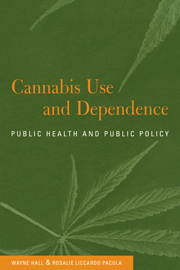Book contents
- Frontmatter
- Dedication
- Contents
- List of figures and tables
- Foreword
- Acknowledgements
- 1 Introduction
- Section 1 Cannabis the drug and how it is used
- Section 2 The health effects of cannabis
- Section 3 The psychological effects of chronic cannabis use
- Section 4 Effects on adolescent development
- Section 5 Harms and benefits of cannabis use
- Section 6 The effectiveness and costs of cannabis prohibition
- Section 7 Policy alternatives
- Appendix 1
- Appendix 2
- References
- Index
Foreword
Published online by Cambridge University Press: 05 July 2016
- Frontmatter
- Dedication
- Contents
- List of figures and tables
- Foreword
- Acknowledgements
- 1 Introduction
- Section 1 Cannabis the drug and how it is used
- Section 2 The health effects of cannabis
- Section 3 The psychological effects of chronic cannabis use
- Section 4 Effects on adolescent development
- Section 5 Harms and benefits of cannabis use
- Section 6 The effectiveness and costs of cannabis prohibition
- Section 7 Policy alternatives
- Appendix 1
- Appendix 2
- References
- Index
Summary
Cannabis is the cutting-edge drug for those interested in drug policy reform, the only drug in the Western world for which legal change is a serious possibility. Indeed, changes are already occurring. The German High Court in 1992 declared that a state which allowed alcohol could hardly criminalise the possession of cannabis; the German states have enacted various forms of decriminalisation. Belgium, hardly known as a bastion of drug reform, expanded the frontier of choices by legalising the use of the drug in private in March 2003. The Swiss government is in the midst of a long process that may result in full legalisation. The medical marijuana movement in the various American states represents, in part at least, a reaction against the harshness of policy toward recreational use of the drug.
The basis for assessing the desirability of these policy and legal changes is weak. The research base on the health and behavioural effects, let alone the consequences of prohibition is slight. For example, there are no studies of the long-term health effects of cannabis use in the general population, itself a remarkable fact, given the number of health studies that have examined far rarer behaviours. Nor can one more than very roughly assess how much marijuana affects automobile accidents and fatalities.
The stepping stone hypothesis, the belief that marijuana use increases the likelihood that a young person will go on to use of more dangerous drugs, is central to the policy debate. Given the simple facts, that those who use marijuana regularly are much more likely to subsequently use cocaine and heroin, the hawks emphasise this with sincerity and passion. Reformers rest their case on methodologically subtle attacks on the interpretation of these facts and produce models which show that the same patterns of use could be accounted for by factors other than the drug itself. Neither side can be said to have made its case strongly. That does not prevent advocates from expressing great certainty. The reformers’ claim that there are no harms is simply wrong. Similarly, the drug warriors’ claims as to the severity and breadth of its harms are hugely exaggerated.
- Type
- Chapter
- Information
- Cannabis Use and DependencePublic Health and Public Policy, pp. x - xiPublisher: Cambridge University PressPrint publication year: 2002



